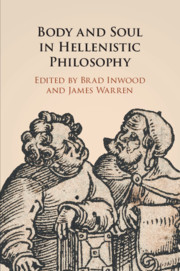Book contents
- Body and Soul in Hellenistic Philosophy
- Body and Soul in Hellenistic Philosophy
- Copyright page
- Contents
- Contributors
- Abbreviations
- Introduction
- Chapter 1 Hellenistic Medicine, Strato of Lampsacus, and Aristotle’s Theory of Soul
- Chapter 2 Herophilus and Erasistratus on the Hēgemonikon
- Chapter 3 Galen on Soul, Mixture and Pneuma
- Chapter 4 The Partition of the Soul
- Chapter 5 Cosmic and Individual Soul in Early Stoicism
- Chapter 6 Soul, Pneuma, and Blood: The Stoic Conception of the Soul
- Chapter 7 The Platonic Soul, from the Early Academy to the First Century ce
- Chapter 8 Cicero on the Soul’s Sensation of Itself: Tusculans 1.49–76
- Bibliography
- Index Locorum
- Subject Index
Chapter 5 - Cosmic and Individual Soul in Early Stoicism
Published online by Cambridge University Press: 20 May 2020
- Body and Soul in Hellenistic Philosophy
- Body and Soul in Hellenistic Philosophy
- Copyright page
- Contents
- Contributors
- Abbreviations
- Introduction
- Chapter 1 Hellenistic Medicine, Strato of Lampsacus, and Aristotle’s Theory of Soul
- Chapter 2 Herophilus and Erasistratus on the Hēgemonikon
- Chapter 3 Galen on Soul, Mixture and Pneuma
- Chapter 4 The Partition of the Soul
- Chapter 5 Cosmic and Individual Soul in Early Stoicism
- Chapter 6 Soul, Pneuma, and Blood: The Stoic Conception of the Soul
- Chapter 7 The Platonic Soul, from the Early Academy to the First Century ce
- Chapter 8 Cicero on the Soul’s Sensation of Itself: Tusculans 1.49–76
- Bibliography
- Index Locorum
- Subject Index
Summary
The structure of this essay is roughly as follows. After an introduction in which I rehearse some of the main elements of Stoic physics and psychology, I set out the evidence for the Stoic doctrine that the individual soul is both analogous to the cosmic soul and a part of it, as was held by the early exponents of the school. I argue that the doctrine threatened to land the Stoics in trouble, unless they were ready to qualify it by applying to it certain distinctions. Then I consider the doctrine’s historical origins, discussing several possible antecedents of it, with a focus on a Socratic report in Xenophon and on Plato’s dialogues, and showing that the Stoics went beyond all their predecessors. After this historical excursus I turn to examine some of the arguments advanced by the early Stoics to prove that the cosmos has a soul, including one which compares the relation between the cosmos and individual human beings to that between a father and his offspring. This leads me to analyse in more detail this comparison which occurs also in other contexts and is sometimes problematically connected with the notion that the individual soul is a part of the cosmic soul. One of the texts which are relevant to this issue, a report in Sextus Empiricus, is the object of a separate discussion in the final Appendix.
- Type
- Chapter
- Information
- Body and Soul in Hellenistic Philosophy , pp. 113 - 144Publisher: Cambridge University PressPrint publication year: 2020
- 3
- Cited by



